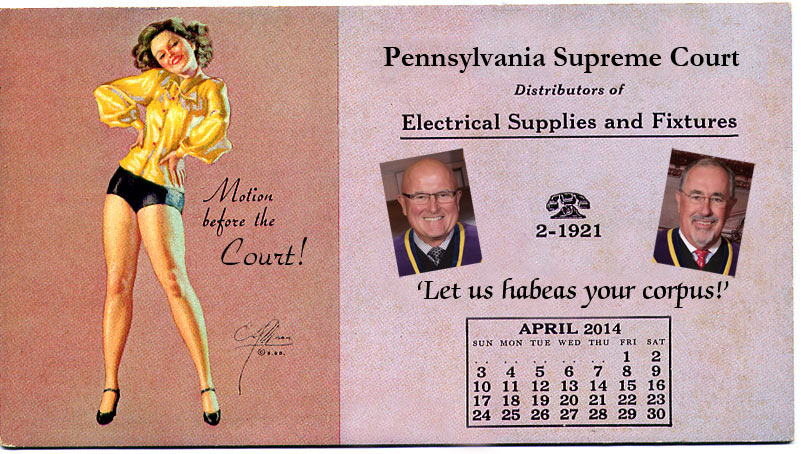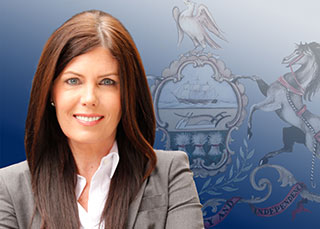Pressure builds for U.S. Justice Department to investigate PA Supreme Court’s porno email chain

State AG Kathleen Kane says federal prosecutors received or sent porno emails
Pressure is building for the U.S. Department of Justice to investigate claims made by Pennsylvania Attorney General Kathleen Kane that federal prosecutors may have shared pornographic and otherwise inappropriate emails with members of the state’s troubled judiciary.
Last week Pennsylvania Attorney General Kathleen Kane said, “The (pornographic email) images themselves aren’t the only story. The problem is the network that’s involved, and the breadth of this network is incredible. This network is judges, U.S. attorneys, attorneys general, law enforcement, district attorneys, and public defenders.”
When asked whether federal prosecutors or U.S. attorneys may be involved in the broadening porno email scandal, AG Kane’s spokesperson, Chuck Ardo, told me, “I’ve never seen the email chain. But I have no reason to doubt the attorney general’s word. I think that once the emails are released and the media and the public has an opportunity to determine who participated in the email chain we will all have a better idea of both the breath and scope of the problem.”
If federal prosecutors or their staff viewed, sent or received pornography during work hours it wouldn’t be the first time.
In 2011, U.S. Senate Judiciary Committee Chairman Chuck Grassley questioned whether the Justice Department properly investigated or disciplined an assistant U.S. attorney who was caught spending hours viewing pornography at work.
At the time, ABC News reported, “In a letter to Attorney General Eric Holder, Grassley ... disclosed a recent review by DOJ’s Inspector General found that an assistant U.S. attorney admitted that he viewed pornography for hours each day during work hours.
“...In a letter to Holder, Grassley said he was concerned about why the federal prosecutor was not charged and why the department has not taken disciplinary action against the prosecutor.”
When asked about the growing Pennsylvania email scandal, Sen. Grassley’s press secretary on the Judiciary Committee, Beth Pellett Levine, said, “This is something I haven’t heard about.”
Shouldn’t the U.S. Justice Department investigate the possible involvement of federal DOJ personnel in the Pennsylvania porno email chain? I asked Levine.
“I think that would be a given,” Sen. Grassley’s spokeperson said. “If U.S. attorneys are involved that would certainly make it more of a federal issue.”
A spokesperson for the U.S. Justice Department, Dena Iverson, wasn’t immediately available for comment.
The U.S. Justice Department supposedly has strict standards of conduct governing its employees.
Kane: ‘The (pornographic email) images themselves aren’t the only story. The problem is the network that’s involved, and the breadth of this network is incredible. This network is judges, U.S. attorneys, attorneys general, law enforcement, district attorneys, and public defenders’ |
|
U.S. Justice Department lawyers or employees must not participate in “misconduct that may be in violation of any law, rule, regulation, order, or applicable professional standard,” department regulations say.
Moreover, U.S. Justice Department “(e)mployees may not engage in outside activities that create or appear to create a conflict of interest with their official duties. Such a conflict exists when the outside activity would: (1) require the recusal of the employee from significant aspects of his or her official duties (5 C.F.R. § 2635.802(b)); (2) create an appearance that the employee’s official duties were performed in a biased or less than impartial manner (5 C.F.R. § 2635.502); or (3) create an appearance of official sanction or endorsement (5 C.F.R. § 2635.702(b)).”
It would seem that sending or receiving porno emails to or from state judges and other court or law enforcement officials fits in to these categories of misconduct violating “professional standards” of federal employees, and conflicts of interest with their official duties to provide impartial and fair justice.
The policy problem for Pennsylvania courts and judges is that they are supposed to be impartial. If, instead, they are part of an entrenched old boy network sharing pornography that undermines the necessary impartiality of state judges, as well as U.S. attorneys or their staff.
As usual in Pennsylvania, though, important policy issues quickly were pushed aside and lost in the smoke of personal and / or political attacks.
Pennsylvania Supreme Court Justice Seamus McCaffery acrimoniously resigned from the court over this matter last year. At the time, news outlets reported that Justice Michael Eakin as well sent or received questionable emails from a Yahoo account under the curious pseudonym “John Smith.”
When the state high court again acknowledged in recent weeks that a second state Supreme Court justice, Eakin, had some involvement in the porno email chain, the state high court demanded that AG Kane turn over the offending correspondence to its own internal Judicial Conduct Board.
Last year, when the issue first arose, the Pennsylvania Supreme Court hired a former judge now associated with the state law firm Duane Morris to supposedly look into the matter. Critics say that state court inquiry was a whitewash meant to protect the court, its justices, employees, and their friends.
Downplaying or parsing the scope of the problem, that court-appointed lawyer wrote last year, “(T)here were no email messages of an improper nature sent by any Justice of the Supreme Court to any representative of the Office of Attorney General, or from any representative of the OAG to any justice of the Supreme Court.” This was apparently in error. And, he wrote, “The email messages reveal no improprieties involving any judge of any other court,” also apparently in error.
This time around, last week, the state high court hired yet another Pennsylvania law firm, Pittsburgh-based Del Sole Cavanaugh Stroyd, to again look into what may or may not be a fresh batch of porno emails handed over by AG Kane.
Trouble is, among other conflicts of interest that undermines the credibility of this latest selection, a senior member of the Del Sole firm, Joseph Del Sole, was a judge on state Superior Court from 1984 to 2006, and himself was a political candidate for the Supreme Court in the 1990s.
Making matters worse, the Del Sole firm also represented Kane in other parts of her ongoing troubles with the high court.
So there are already serious questions about this latest court-sponsored internal “inquiry,” and whether Pennsylvania officials can conduct a serious and thorough investigation of themselves.
Critics insist that the badly tarnished Pennsylvania Supreme Court cannot be trusted to investigate itself, or to hire a state law firm to do a credible job.
No Pennsylvania law firm, under the yoke of the troubled court, will or can be perceived as able to conduct a true, untarnished or trustworthy inquiry into the high court, long-time court watchers say. In matters of our judiciary, perceptions are as important as realities.
For decades, as the state Supreme Court descended into outright and outrageous corruption, state lawyers have repeatedly complained that they’re afraid to speak up for fear of retaliation against them or their clients by the court system, now or down the road.
What proof do we have that this fear of retaliation by the state courts is still in operation?
Despite a widening and historic mess involving the entire Kane and Supreme Court matter, there is a deafening silence from the state’s thousands of attorneys.
Pennsylvania lawyers simply are afraid to speak up, let alone investigate, or call for an investigation, of the high court.
That’s why there’s a growing sense that an independent criminal investigation by the U.S. Justice Department is required.
Especially if, as Kane says, U.S. attorneys or their workers were participants with the state judges in the porno email chains.
Ardo, Kane’s spokesperson, says it’s his understanding that Kane intends to publicly release all of the thousands of pornographic or inappropriate emails she uncovered, including those that she recently handed over to the court’s internal Conduct Board and the state ethics office.
“No one has told me anything other than her intention to release all the emails,” Ardo says. “This is an historic occasion.”
A state official who asked not to be identified said a federal prosecutor recently called for a special prosecutor to examine the email chain.
Observer say it’s vital that the U.S. Department of Justice undertakes a full and complete criminal and ethical investigation into the Pennsylvania Supreme Court’s current porno email scandal.
The incestuous nature of this growing scandal highlights a concern that thousands of Pennsylvanians may have had their civil rights violated by denying them an impartial day in court.
This wouldn’t be the first time in recent Pennsylvania history something like that has happened. In 2009, the state Supreme Court vacated some 6,500 convictions of juveniles in the Cash for Kids scandal. In that Dickensian state court affair, operators of a private detention facility for years bribed state judges.
In the Cash for Kids scheme, the high court waited almost two years to take action after first advised of the problem. It turned out the son of a state Supreme Court chief justice was co-owner of the private detention facility bribing the judges.
The Cash for Kids scandal, and it’s close family ties to the high court, have yet to be adequately investigated.
- Bill Keisling
posted October 8, 2015

